protests
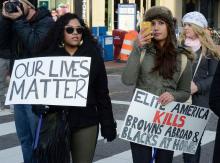
On Dec. 6, protests ensued at Texas A&M University during an on-campus speech from Richard Spencer, a white nationalist and the self-proclaimed head of the so-called "alt-right" movement, reports the Houston Chronicle. Protesters were met with — and pushed by — law enforcement officials in riot gear and riding on horseback.

The protests that break out on the streets in the aftermaths of killings are not just about the latest individual case, but the lack of trust in a system of policing and criminal justice that justice needs to be put back into. The protests are about accountability in an age where police who use excessive force and act outside the law that they pledge to protect are almost never held accountable.

Now is not the time for fracking oil – a pipeline destined to leak, another broken treaty, or further racist, heartless disregard for a people who have already suffered unconscionable cruelties. Now is the time for intensive care for a dying world. It is also a time for reparations – to the indigenous tribes of this land, to African Americans, and to all those around the world on the receiving end of our violence. By reparations, I mean not just compensation, but real healing of relationships. War, arrogance and greed have pulled us all to the brink of destruction, and only cooperation, humility and generosity can save us.
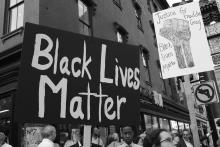
In the last year, the group has met with civic leaders, including four mayoral candidates, police commissioner Kevin Davis, and the governor’s Justice Reinvestment Coordinating Council, the council tasked with crafting a plan to reduce the prison population in Baltimore. Several leaders, including Archbishop Lori, went to West Baltimore following the protests to help clean up and lead services. Imam Earl El-Amin of the Muslim Community Cultural Center of Baltimore said several members had developed a relationship with a seniors’ building during the uprising, sharing medicines and food. Rev. Deckenback’s church has been accepting donations over the last year for areas impacted by protests.
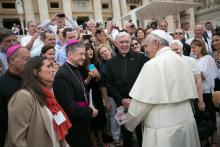
The morning after a Chicago rally for Donald Trump was canceled for fear of violence, the city’s Catholic archbishop warned that “enmity and animosity” are hallmarks of today’s politics and a “cancer” that is threatening the nation’s civic health.
“Our nation seems to have lost a sense of the importance of cultivating friendships as fellow citizens who, being equal, share much in common,” Archbishop Blase Cupich said in a homily March 12 at Old St. Patrick’s Church.
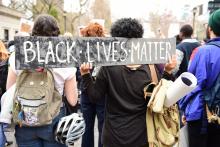
St. Louis County Executive Steve Stenger declared a state of emergency in Ferguson, Mo., today, urging County Police Chief Jon Belmar to “exercise all powers and duties necessary to preserve order, prevent crimes, and protect the life and property of our citizens,” the St. Louis Post-Dispatch reports.
The state of emergency comes after the arrests of at least 56 protesters, including prominent activists Deray Mckesson and Johnetta Elzie and famed writer Cornel West.
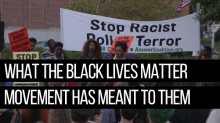
Sunday marked the 1-year anniversary of the killing of Michael Brown in Ferguson, Mo. Both in Ferguson, and across the country, the memorials and marches were held to remember those lost to police violence. Here in Washington, D.C., we attended one such demonstration and asked protesters what the #BlackLivesMatter movement has meant to them over the past year.

“IT ALL STARTED with pig races,” said Dawud, the groundskeeper at the Muslim American Society’s mosque in Katy, Texas. Soon after the group purchased the land, their neighbor, Craig Baker, began hosting well-publicized hog heats for some 300 spectators every Friday evening. Baker’s timing was deliberate, chosen to correspond precisely with the jummah prayers—the holiest time of the week for Muslims—and to offend their dietary restrictions, which forbid pork.
That was back in 2006. Today, things are more peaceful. Follow the narrow road that curves amid loblolly pines and sage grass, and you’ll see sun gleaming off the black roof of the now-finished mosque. “It was a matter of disagreement, but it’s over now,” said Dawud last fall. “I am happy it’s done and we are at peace.”
But while the pig races have ended, signs of hostility linger: Two blue and white billboards bearing a Christian cross and a Star of David are posted just off the edge of the mosque’s property. The intended message isn’t subtle: “Muslims, you don’t belong here.”
Though many Americans actually had favorable views of Islam after 9/11, a recent study by Georgetown University’s Bridge Initiative found that those views became increasingly negative throughout the Iraq war.
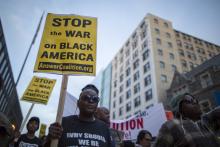
Hundreds gathered at Gallery Place Metro in Washington, D.C., on Wednesday night in solidarity with Baltimore activists to protest the death of Freddie Gray. The crowd marched for two hours across the city until reaching their final destination at the White House.
Leaders from multiple activist groups were helping lead the crowd, including Eugene Puryear, a candidate for the At-Large seat in the D.C. Council. The crowd began the march with chants of, "All night, all day, we're going to fight for Freddie Gray!" More solidarity events have been planned by the event organizers in the upcoming days.
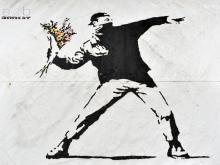
Recent protests in Baltimore are raising the question of (non)violence anew. Should violent protesters be criticized? Should Christians call for nonviolence?
Some bluster “Of course!” while others say that’s not the point.
Over at The Atlantic, Ta-Nehisi Coates, who grew up in Baltimore, is challenging calls for nonviolence in an article entitled “Nonviolence as Compliance.” Calling “well-intended pleas” for nonviolence “the right answer to the wrong question,” Coates writes:
When nonviolence is preached as an attempt to evade the repercussions of political brutality, it betrays itself. When nonviolence begins halfway through the war with the aggressor calling time out, it exposes itself as a ruse. When nonviolence is preached by the representatives of the state, while the state doles out heaps of violence to its citizens, it reveals itself to be a con. And none of this can mean that rioting or violence is "correct" or "wise," any more than a forest fire can be "correct" or "wise."
The line bears repeating: “When nonviolence begins halfway through the war with the aggressor calling time out, it exposes itself as a ruse.” Are newly scared white folks simply “calling timeout?”
Coates wants to ground our conversation about violence in the narrative of a larger “war.” For him, violence did not “break out” last night – violence has always been present. Coates wants to shift our focus from the shorter story of rock-throwers to the much longer story of the black experience in the United States.
As the clergy marching in Baltimore put it, “There’s been a state of emergency way before tonight.”

As thousands took to the streets in Baltimore on Monday night to protest the death of Freddie Gray on th eday of his funeral, nearly 100 clergy joined the protesters.
Freddie Gray, a 25-year-old black male, died April 19 while in police custody, one week after his arrest. Although one of the officers reported Gray “was arrested without force or incident,” Gray died of severe spinal injury, prompting citizens to question how Gray was treated in custody.
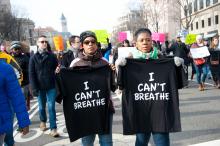
Maybe I am the only one wondering “What can I do?” as I watch and read the news of demonstrations throughout the country. I have a lot of excuses. I can’t go to the protests tonight because my son has a concert. I don’t coordinate the church service and announcements, so I can’t control what will and won’t be said. I’m on sabbatical so I won’t be a part of the conversations that I hope will happen between colleagues at meetings. But I hope I am not the only one wondering what can be, needs to be, ought to be done.
The videos are chilling – Eric Garner’s life is being choked out of him until he goes limp on the sidewalk and Tamir Rice is being gunned down, the police squad door barely opening as the officer drives by. The images of protests and protesters being tear gassed and throwing canisters back at police armed in riot gear remind me of the summer I spent in Korea, marching in protests against U.S. military presence. That was the summer I learned about wearing damp handkerchiefs near my eyes and over my nose to help with the sting of tear gas and how to wet the wick of a homemade Molotov cocktail before lighting and lobbing. A few years later in a hotel room in Indiana after a job interview, I watched protests and riots take over Los Angeles. Living with, wrestling with injustice day in and day out is a bit like a kettle of water just about to hit boiling. At some point, the water boils, the steam is released.

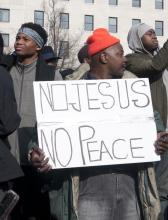
“Excuse my ignorance, I thought I was a free black man.”
“I’m 11 [years old], I matter.”
“You can choose to look away, but never again can you say you didn’t know.”
“How many times do we have to protest the same [s**t]?”
“White silence is white violence.”
“We have nothing to lose but our chains.”
These signs, and many others, lined the horizon of Pennsylvania Avenue on Saturday in Washington, D.C. In a ‘Justice for All’ march organized by Al Sharpton and the National Action Network, thousands of protesters gathered to protest police actions that have resulted in the deaths of unarmed young black men across the United States.
After marching from Freedom Plaza to the U.S. Capitol, protesters listened to speakers from national racial justice organizations address some of these most recent acts of police brutality.
Al Sharpton sought to draw attention to the diversity present on the streets.
“This is not a black march or a white march. This is an American march for American rights,” he said.
Indeed, the black community was not alone in speaking up against police brutality. One Latina activist encouraged her Latino brothers and sisters to “voice their pain” from police harassment and “come forth and unify with the African American community so we can be strong together.”
“¡Ya Basta!” she concluded. [“Enough is enough!”]




The three of us put our cups of coffee on the counter and reached into our pockets for our wallets. The check-out clerk paid no attention to any of us. He seemed to be staring at someone or something in the back of the store.
“We’re ready to pay,” one of us said.
The clerk kept looking at the back of the store. A few seconds went by before he told us what had his attention.
“I’m watching that boy over there to make sure he don’t steal nothing,” the clerk said.
The three of us looked at the back of the store and realized the clerk was talking about our co-worker.
Four of us were carpooling across Florida on a work assignment several years ago. It took several hours to cross the state. We stopped at a place called Yeehaw Junction off Route 60 to use the restroom and get some coffee.
The three of us at the check-out counter were white, like the clerk. The co-worker accompanying us was black. The clerk assumed that because the three of us were white, we would understand and agree with his attitudes and assumptions about our co-worker – that he was dishonest because of the color of his skin. Needed to be watched. Couldn’t be trusted. Too dangerous to let out of his sight.

